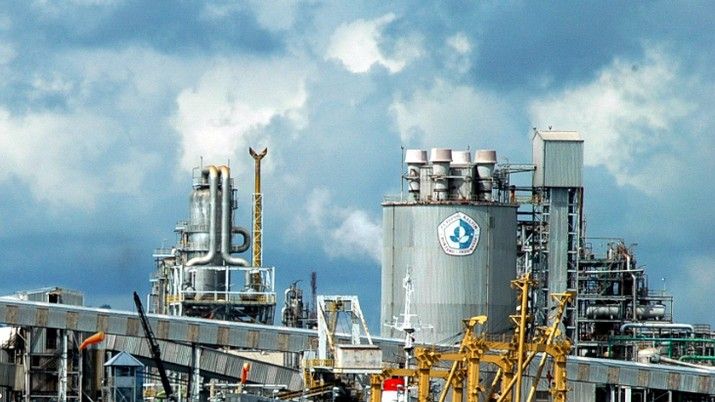Pupuk Kaltim’s Serious Attention To the LCA Policy

Complying with LCA regulations is one of the ways PT Pupuk Kalimantan Timur (Kaltim) is supporting Indonesia’s goal of reaching net zero emissions by 2060 or earlier.
The goal was restated by Coordinating Minister for Maritime Affairs and Investment, Luhut Binsar Pandjaitan, at the COP26 Climate Change Conference that took place in Glasgow, Scotland, last November. The minister also stated that Indonesia is currently on the right track to achieve the target of reducing Green House Gas emissions by 29 percent on its own effort. This effort, of course, includes an all-hands-on-deck approach to all business practices, products, or services.
To measure the success of the company’s effort of reducing its carbon, the Indonesian government advises companies to conduct and adhere to the Life Cycle Assessment or LCA. The LCA is a framework assessing the environmental impacts of product systems and decisions. It works by evaluating the environmental impacts through the entire life cycle of a product or service, that is the production, distribution, use, and end-of-life phase. It covers the five environmental aspects of water efficiency and reduction of wastewater pollution load, reduction of air pollution, 3R for toxic hazardous waste, 3R for non-toxic hazardous waste, and protection of biodiversity.
The result of the LCA is then going to be submitted to the Ministry of Environment and Forestry (KLHK) for the fulfillment of the National PROPER green documents. The ministry then gives companies a rating of how well they are in managing their environmental impact while at the same time reducing their carbon production.
Pupuk Kaltim President Director Rahmad Priadi revealed that for the last two years, the company had complied with the LCA and noted an improvement in performance for the five environmental aspects.
“We continue to improve the performance of these five aspects, and the positive record over the past year is proof of the Pupuk consistency with this commitment,” stated Rahmad.
Pupuk Kaltim’s Achievement in the Five Environmental Aspects of the LCA
Rahmad Pribadi noted that in 2020, Pupuk Kaltim has managed to utilize or recycle more than 7 million liters or 80,87% of the total water demand. Meanwhile, in the aspect of reducing air pollution, Pupuk Kalim recorded a reduced volume of Greenhouse Gas (GHG) emissions of more than 600 thousand tonnes of CO2, or equivalent to 16,73% of the company’s total emission burden.
He further explained that the number was achieved through 23 programs that cover emissions reductions in the production process to supporting facilities. The effort gained them a National PROPER Gold Rating award from the Ministry of Environment and Forestry (KLHK) for the fourth time in 2020.
Meanwhile, Pupuk Kaltim has achieved a very effective waste reduction in the third environmental aspect of the LCA which is the 3R or reduce, reuse, and recycle for toxic hazardous waste (B3). According to SWA, throughout 2020, the reduction of toxic hazardous waste reached 245,67 tonnes from 8 innovation programs.
This achievement is the result of implementing a series of 3R programs like reducing toxic hazardous waste of used oil, replacing chemical packaging with refill packaging, decoking the primary reformer catalyst, reducing toxic hazardous waste of used resin in the Mixbed unit, and utilizing toxic hazardous waste Fly Ash – Bottom waste Ash. It even includes a practice of using refill ink in their office area.
Furthermore, Pupuk Kaltim also works with third parties who have permits to utilize toxic hazardous waste. In 2020, 98% of the toxic hazardous waste produced by Pupuk Kaltim will be handed over to licensed third parties for further management, while the remaining 2% will be used internally for brick and paving block production.
For the fourth environmental aspect of the LCA, which is the 3R for the non-toxic hazardous waste (non-B3), Pupuk Kaltim has managed to reduce their non-toxic hazardous waste and domestic waste by 2231,13 tons. The waste reduction was done through a series of programs such as the use of online electronic systems, Beat Plastic Pollution, and the conversion of raw materials purchased in bulk form which were originally packaged in sacks. To top off, they also implemented a series of recycling programs that includes practices such as composting and reusing used sacks as a material in asphalt mixture along with turning them into handicraft bags.
Lastly, in their effort to fully comply with the LCA, they also implemented a Biodiversity Protection Program. Rahmad Pribadi noted that with the nature of their company and the product they supply, it is important to keep in mind the health of the environment around them.
“Not only waste management, but we also understand very well the importance of protecting biodiversity. Especially considering that the environment around the Company is supported by biodiversity consisting of coastal ecosystems and lowland tropical rainforest ecosystems. Therefore, Pupuk Kaltim has implemented a Biodiversity Protection Program,”
The Biodiversity Protection Program includes designating 30% of Pupuk Kaltim’s industrial area as Green Open Space and implementing an Artificial Reef Planting Program of 500 units annually to rehabilitate reef conditions and increase the reef fish population. It also includes carrying out other biodiversity initiatives such as rare plant nurseries and planting mangroves.
As a state-owned enterprise that mainly supplies fertilizers for Indonesian farmers, Pupuk Kaltim is aware of its responsibility to the environment by complying with environmental regulations such as the LCA and performing a more sustainable production.
“What we are doing is not just fulfilling our responsibilities, but is also driven by full awareness that the sustainability of the environment around us is vital to ensure the sustainability of the Company and its ecosystem,” said Rahmad. (Safaanah)
